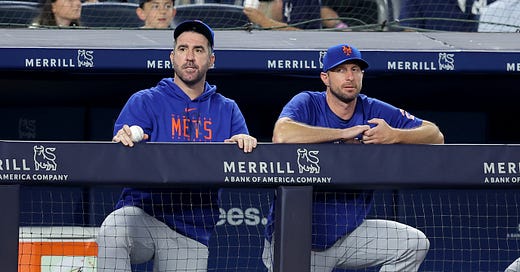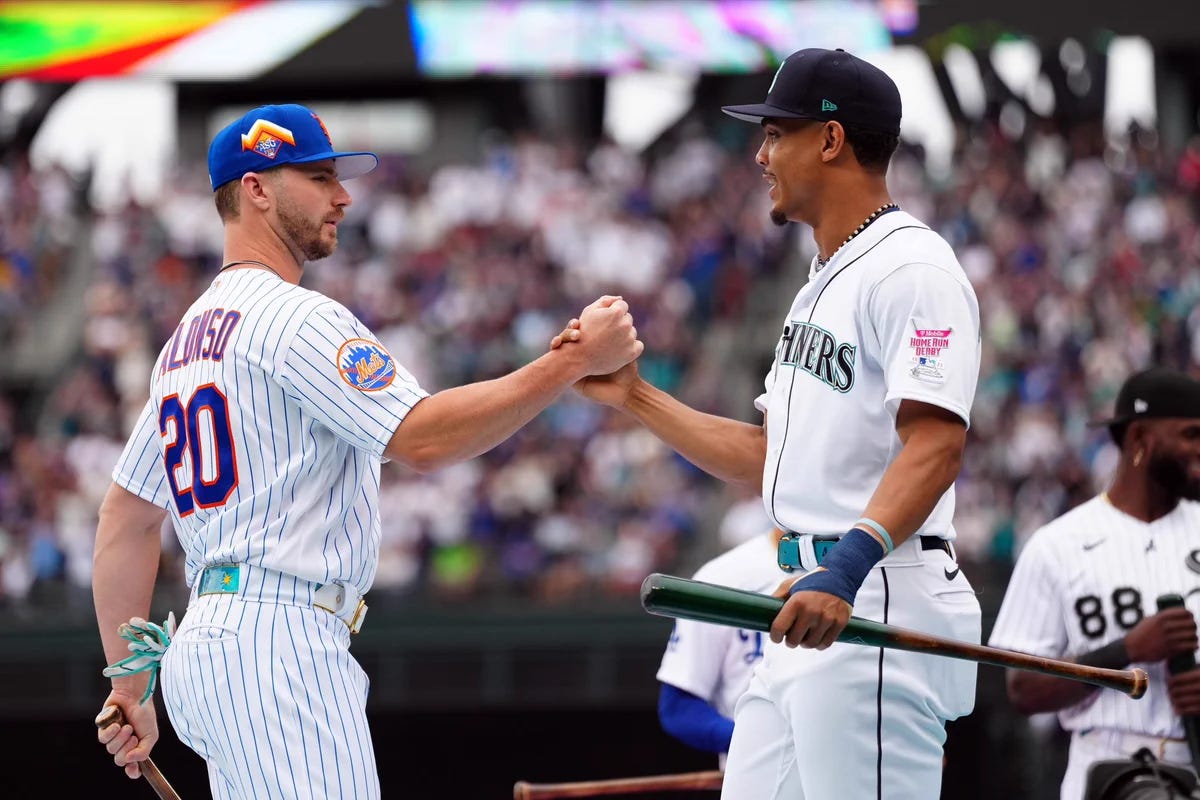Why The Mets Shouldn't Trade Verlander. Or Alonso
Future Hall Of Famer One Of The Biggest Trade Chips Available Today...
If the New York Mets are serious about becoming a model franchise where winning is established as the gold standard, then trading Justin Verlander is not the correct way to go.
Verlander is without doubt one of the biggest trade chips available at the Trade Deadline. Teams have until 6 p.m. EST on Tuesday to either fine-tune their roster or to continue to strip away parts.
Currently six games out of a wild card spot, the Mets officially waved the white flag on their shocking, embarrassing disaster of a season last week. They began the process of becoming sellers by trading reliever David Robertson to the Miami Marlins for a pair of prospects. The front office then put the sell-off into turbocharge mode by dealing away ace Max Scherzer to the Texas Rangers. Granted, the Mets got back a top-50 prospect in Luisangel Acuña, but it was still a move that sent seismic waves throughout the baseball world. Veteran outfielder Mark Canha was also dealt to the Brewers.
After all, by trading away a future Hall of Famer in Scherzer, the Mets made it be known that they had given up on this season, and potentially 2024 no matter what General Manager Billy Eppler may say. Not being competitive next year is certainly on the brain of Verlander, who made some pretty interesting comments in the wake of the Scherzer trade.
“When you see that happen, you can’t help but think what it says for next year,” Verlander said of the Scherzer trade to reporters. “It changed my opinion a little bit. It was tough to see it happen.”
And that’s why shedding Verlander from the roster today would be a mistake of behemoth proportions.
You don’t have to be a genius to work out that the clubhouse is currently questioning Ownership’s intentions for the 2024 season and beyond. Pete Alonso has also come out and raised some concerns, and trading Verlander won’t exactly ease those doubts.
Instead, by dealing away your second ace in a matter of days, the front office would effectively be telling the likes of Alonso, Francisco Lindor, Brandon Nimmo and Kodai Senga that they aren’t really serious about winning anytime soon.
Now, there will be those who will rush to respond with the fact that there will be a slew of high-end starters available in free agency. That’s true. But, my argument is why fix what isn’t broken? Why go out and spend more money on an ace when you already have one in Verlander?
While he had a rough start to life in Queens - posting a 4.50 ERA in his first nine outings - Verlander has figured it out and then some since. He boasts a stellar 1.49 ERA in his last seven starts, allowing just seven runs in 42 1/3 innings during that same span. The three-time Cy Young Award winner has been locked in for the last month or so, and he looks every inch the vintage Verlander we’ve all loved watching for the better part of two decades or so.
That version of Verlander gives the Mets the best chance of being a contender in 2024. There’s no doubt about that.
Of course, like with any of these discussions, you have to be willing to play devil’s advocate too. Verlander is owed around $59 million through 2024, and another $35 million in 2025 if he throws 140 innings in 2024 and ends the year healthy. That’s a lot of money to pay an aging pitcher who is on the wrong side of 40 and who has had recent troubling injury history. His strikeout percentage has also plummeted from 35.4% in 2019 to just 21.0% this year. Plus, with that in mind, if a team like the Dodgers or the Orioles, with the latter loaded with blue-chip prospects, come in with a blockbuster offer that would really help to bolster the farm system, then the Mets would obviously have to seriously consider trading their ace.
However, it is the optics and the underlying aftershocks that often get overlooked when assessing potential trades of this magnitude. Dealing away a uber-talented star that you gave a truckload of cash to this past offseason isn’t a good look, and it undermines Owner Steve Cohen’s desire to transform this franchise into a perennial winner.
You aren’t really serious about winning anytime soon if you trade both Scherzer and Verlander. No matter the myriad of high-end prospects you may get back in return. That won’t help you win in 2024. It also tells the clubhouse you are about to pull the trigger on a rebuild, no matter how many platitudes suggesting otherwise you spit out publicly.
Trading away Verlander would effectively act as a death knell to the Mets being considered legit World Series contenders in 2024. It just would.
The same argument applies to Pete Alonso. According to Tim Britton and Will Sammon of The Athletic, the Mets have made Alonso, who is a pending free agent in 2025, available on the trade market over the last week. Now, the likely steep asking price for Alonso means it is highly unlikely he’ll be dealt on Tuesday.
But, again, the very optics of even having discussions about trading a franchise cornerstone like Alonso directly contradicts Ownership’s desire, or stated desire, to be a winner now. The two just don’t jive. Period.
The fact that Billy Eppler has spoken with Lindor and Nimmo about the future, but not Alonso, is another stinking look from the organization. To me, it tells me that keeping one of the best power hitters in the game today isn’t high on the front office’s priority list after all. And that in itself is a huge problem.
The Mets, with the highest payroll in all of baseball, and by quite some distance, were meant to win in 2023. The roster as is currently constituted was built to compete now and for the next few years at the very least.
Trading Verlander at the Trade Deadline would come into direct conflict with that mission statement, and it may hurt this franchise further down the road. After all, why should Alonso want to stick around after 2024 if the team isn’t striving to compete at the highest level? Why would an elite masher who would fetch a truckload of cash on the open market, want to stick around with a team that seems destined to flip-flop between trying to compete and tearing it all down every few years?
That’s why the potential of trading Justin Verlander on Tuesday shouldn’t just be about getting a glut of blue chip prospects in return. There is a bigger conversation to be had, and that’s the message it would send to the clubhouse. That this team isn’t really serious about winning after all. And that could have dire long-term consequences for this franchise.
That’s exactly why the New York Mets shouldn’t trade Justin Verlander. Or Pete Alonso for that matter.
Period.







